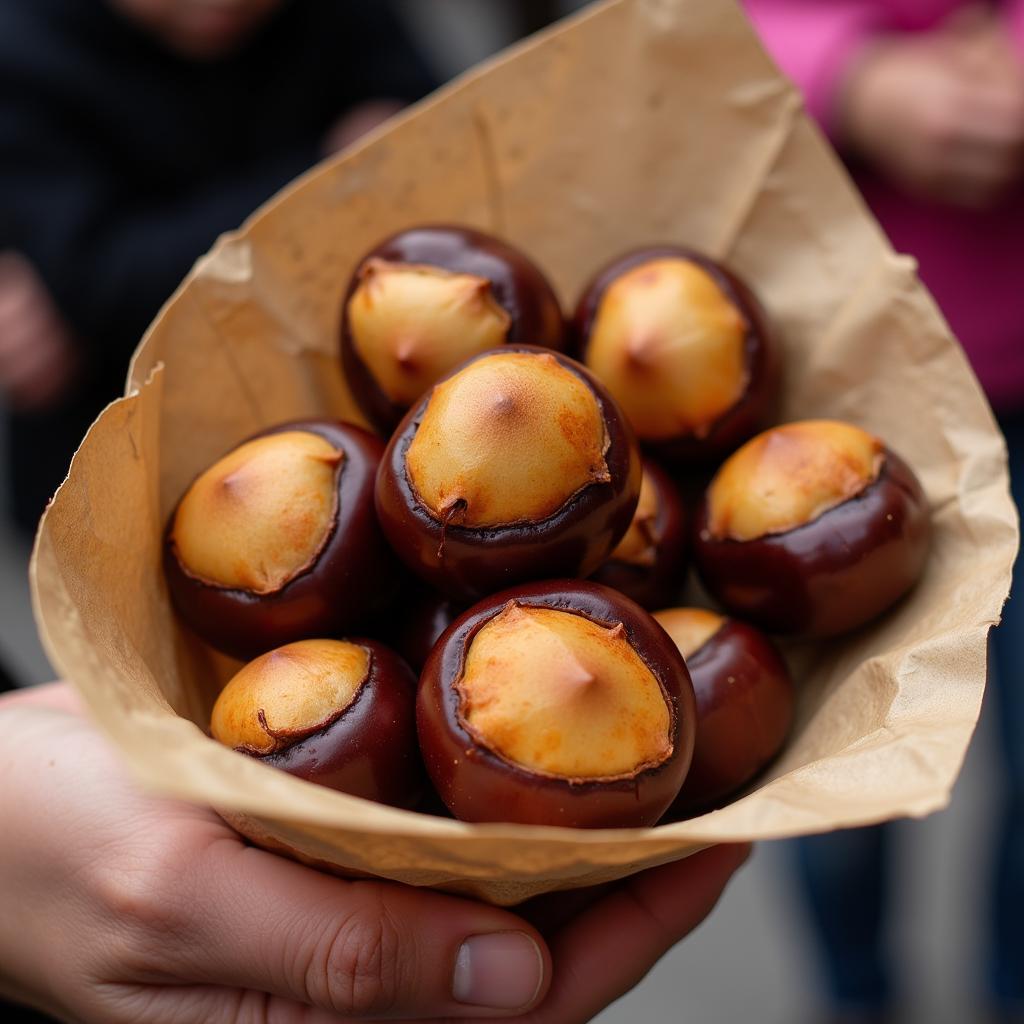
Castano in English: Unlocking the Meaning and Significance
Castano In English translates to “chestnut” or “brown.” This seemingly simple word holds various meanings and significance depending on the context, from describing hair color to the rich flavor of roasted chestnuts. As a football player, I understand the importance of precision and detail. Just like a perfectly placed pass, understanding the nuances of language can open up a whole new world of communication and connection.
Decoding “Castano”: From Hair to Horses
The most common use of “castano” in English is to describe brown hair, specifically a rich, warm brown often associated with chestnut trees. It’s a common descriptor in many cultures, particularly in romance languages. Think of the flowing, castano locks of famous footballers, or the descriptions of characters in literature. Beyond hair, “castano” can also refer to the chestnut tree itself, its wood, or the edible nuts it produces.  Castano Hair Color In some contexts, particularly in the equestrian world, “castano” can also describe a horse’s coat color, similar to bay or chestnut. This usage is less common in everyday English but important to note for those interested in horses or equestrian sports.
Castano Hair Color In some contexts, particularly in the equestrian world, “castano” can also describe a horse’s coat color, similar to bay or chestnut. This usage is less common in everyday English but important to note for those interested in horses or equestrian sports.
Castano beyond the Basics: Cultural and Culinary Connections
The word “castano” carries cultural weight, particularly in regions where chestnut trees are prevalent. The chestnut itself is a symbol of autumn, warmth, and nourishment. Roasted chestnuts are a beloved seasonal treat in many parts of Europe, often enjoyed during holiday festivities.  Roasted Chestnuts This culinary connection adds another layer of meaning to “castano,” evoking images of cozy winter evenings and shared meals with loved ones. The deep, earthy brown of roasted chestnuts also contributes to the visual association with the color itself.
Roasted Chestnuts This culinary connection adds another layer of meaning to “castano,” evoking images of cozy winter evenings and shared meals with loved ones. The deep, earthy brown of roasted chestnuts also contributes to the visual association with the color itself.
Castano in Football: A Metaphor for Strength and Resilience
As a footballer, I often look for metaphors and inspiration in the world around me. The chestnut tree, with its strong roots and ability to withstand harsh weather, symbolizes resilience and strength, qualities essential in the world of football. The rich, deep brown of the chestnut also represents the earth, grounding, and stability. Just like a strong defense, a solid foundation is crucial for success on the field. The “castano” color, with its warm and inviting tone, also fosters a sense of community and belonging, much like the camaraderie within a football team.
Conclusion: Understanding “Castano” in All its Forms
From hair color to culinary delights, “castano” in English encompasses a range of meanings and cultural associations. Understanding these nuances allows for a richer appreciation of the word and its significance. Whether you’re describing someone’s hair, discussing the taste of roasted chestnuts, or simply admiring the beauty of a chestnut tree, knowing the English translation of “castano” allows for clearer communication and a deeper connection to the world around us.
FAQ: Your “Castano” Questions Answered
- What is the most common English translation of “castano”? Chestnut or brown, particularly referring to hair color.
- Can “castano” be used to describe anything other than hair? Yes, it can also refer to the chestnut tree, its wood, the edible nut, or even a horse’s coat color.
- What is the cultural significance of “castano”? It’s associated with autumn, warmth, nourishment, and holiday traditions, especially in regions where chestnut trees are common.
- How is “castano” related to football? The chestnut tree symbolizes resilience and strength, essential qualities in football.
- Why is it important to understand the different meanings of “castano”? It allows for clearer communication and a deeper appreciation of the word’s cultural and contextual significance.
Other Resources on Cầu Thủ Bóng Đá
- Learn more about football terminology and techniques
- Discover training tips and advice from professional footballers
- Explore the latest news and updates from the world of football
Need further assistance? Contact us at Phone Number: 0937522908, Email: [email protected] or visit us at Cầu Huỳnh Thuận, ấp Hưng Lợi Đông, Lấp Vò, Đồng Tháp, Việt Nam. Our customer service team is available 24/7.